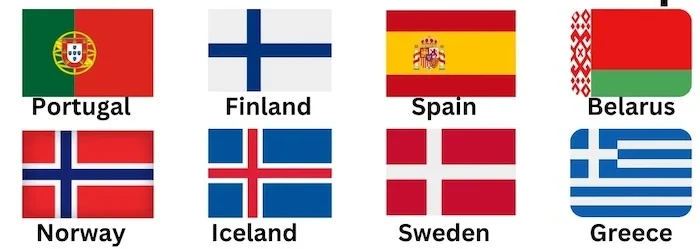Table of contents
- Top 10 Socialist Countries
- What is socialism?
- Socialist Countries in Europe
- Successful Democratic Socialist Countries
- #1 Slovenia is our best socialist country
- #2 Belgium
- #4 Sweden
- #5 Netherlands
- #6 Norway
- #7 Denmark
- #8 Moldova
- #9 Costa Rica
- #10 Uruguay
- Capitalist Socialist Countries
- Most Successful Democratic Socialist Countries
- Socialist Countries in History
- Best Socialist Countries to Move to
Top 10 Socialist Countries
We have identified the best socialist countries to visit, or even live in. The term socialism has different meanings to different people. Some leftists would see none of these countries as being ‘socialist’, while others would see them as Socialist or Democratic Socialist Countries.
What is socialism?
For the purpose of rating our top 10, we are using a pragmatic approach to defining ‘socialism’. Karl Marx would not approve, but with few socialist systems and a complete absence of what he defined as communism, we have little choice. Therefore, we are listing those countries where the government intervenes to tame the injustice and violence of ‘capitalism’ in the name of justice, equality and the environment.
Socialist Countries in Europe
Many of the countries on our list are democratic socialist systems that tolerate a higher level of private sector control. The list reflects the success of the Nordic model of government which retains a number of socialist ideals and a number of socialist elements, while facilitating capitalism.

Successful Democratic Socialist Countries
The below list is dominated by European democratic socialist countries. It reflects the success of policies have been operating in a number of Scandinavian countries for many decades. No doubt some will credit democratic socialism with that result, while others may point to the colonial past of some of those nations in placing them in such a privileged position. We will let you decide.
#1 Slovenia is our best socialist country
Formerly knows as ‘Socialist Republic of Slovenia’, Slovenia ranks above average in social and economic indicators. So this includes earnings, housing, health status, social connections, work-life balance, environmental quality, and personal security.
88% of adults aged 25-64 have completed upper secondary education (higher than the OECD average of 78%).
Life expectancy in Slovenia is 81 years (one year higher than the OECD average).

#2 Belgium
Number 2 of our top socialist countries is Belgium. Belgium is small and densely populated. The annual growth rate of the Belgian population is very low; overall birth rates and immigration exceed death rates and emigration only slightly.
Life expectancy in Belgium has continued to increase while the death rate has fallen. This has been due to advances in medicine and public health. Belgium is also providing better care during childbirth, leading to higher births rates. Life expectancy in 2016 was 80.5 years (a significant increase from previous years), with male life expectancy at 78 years and the female life expectancy at 83 years.
#3 Finland
Coming in at number 3 of our 10 best socialist countries is Finland. The central role of the state is illustrated by the fact the Finnish government owns nearly one-third of the nation’s wealth.
Labour has real power in Finland. A large and powerful labour movement gives Finnish workers significant power in the economy. Indeed, around 90 percent of Finnish workers are covered by a union contract.
In addition, Finland has one of the best education systems in the world. There are no fees and students even receive free meals. Indeed, Finland has a 100 percent literacy rate and one of the highest living standards in the world.

#4 Sweden
Sweden has higher than average taxation rates. However, the high levels of taxation are used to provide a wide range of public services.
Sweden has one of the very best education systems in the world. The Swedish Education Act says that all people are to have equal access to education, regardless of gender, location or wealth. In addition to education, the state funds health care and the child care costs of citizens.
Gender equality and embracing diversity is natural in Sweden. There are laws against discriminatory behaviours. In addition, the vast majority of Swedish people find such behaviours unacceptable and taboo.

#5 Netherlands
The Netherlands makes our list of the best socialist countries because it is very egalitarian and organised. Bosses even treat their workers with respect!
Dutch governments use direct and indirect taxes to fund extensive welfare rights. They levy a graduated personal income tax and a property tax, a motor vehicle tax, an energy tax, and a tax on legal transactions.
The government has imposed rent controls to protect tenants. Education is mainly publicly funded and all public transportation in the country is owned by the Government. As a result, the state controls prices and schedules. All this makes the Netherlands #5 in our list of the best socialist countries
#6 Norway
The main political division reflects differing views on the importance of free-market forces; but non-socialists have accepted extensive governmental control of the country’s economy.
Such evident national consensus—along with abundant water power, offshore oil, and peaceful labour relations—was a major factor in the rapid growth of Norway as an industrial nation during the 20th century and in the creation of one of the highest standards of living in the world, reinforced by a comprehensive social welfare system. Life expectancy rates in Norway are among the highest in the world.

#7 Denmark
Denmark consistently ranks in the world’s top nations for quality of life. This Scandinavian nation is known for its excellent track record in terms of child care, safety standards, and enabling infrastructure. Citizens with per capita GDP of over $55,000 are more than happy to pay higher taxes as they are getting the best atmosphere for the upbringing of children.
#8 Moldova
Public primary and secondary schools are free of charge. The state provides some materials like textbooks for free.
Moldova has a social security system that includes contributions from both employers and employees, and it has international agreements with other countries to coordinate social security benefits for migrant workers. The system includes pensions, disability benefits, and social assistance, with recent increases in minimum pensions for retirees and those with disabilities.
#9 Costa Rica
Costa Rica is a beautiful country in Central America known for its stunning biodiversity, lush rainforests, and beautiful beaches. It’s a popular destination for ecotourism, with national parks and reserves protecting a wide array of wildlife and natural habitats. The country is also renowned for its commitment to sustainability and conservation.
Costa Rica has achieved a record high rural literacy rate at 96% for children. This means that nearly all children in rural Costa Rica are educated.

#10 Uruguay
Uruguay has a strong tradition of social democracy and progressive policies. The country has implemented various social welfare programs, progressive taxation, and labour rights protections that reflect social democratic principles. Its political landscape features multiple parties, including the left-leaning Broad Front (Frente Amplio), which has influenced policy direction in recent years. However, Uruguay operates within a mixed economy with a market-driven system rather than a socialist economic model.
Uruguay’s gross national product (GNP) per capita is among the highest in Latin America, and the nation has a large urban middle class. Its relatively high standard of living has historically been based on earnings from agricultural exports, notably wool and beef, which have nevertheless been subject to fluctuations in the world market.

Capitalist Socialist Countries
Socialists critique capitalism as a system of private ownership where capitalists own the means of production and extract surplus value (profit) from workers’ labour. Capitalists do this by exploitation, in paying workers less than the value of their labour and keeping the difference between this amount and the price they sell goods for. The difference or ‘profit’ is seen by socialists as simply ‘theft’.
However, socialists believe that everyone who contributes to the production of a good is entitled to a share in it. Therefore, society as a whole should own, or at least control property for the benefit of all its members. Hence, socialism promises to share wealth evenly and fairly across the economy.
Capitalism
According to this simple definition of socialism, capitalism rewards those who own the means of production at the expense of those who have nothing to sell but their labour. It is hard to disagree with this.
In addition to economic inequality, capitalism has led us into the climate crisis and environmental destruction. The idea that you are entitled to as much of the world’s resources as your money can buy is making planet earth uninhabitable.

Most Successful Democratic Socialist Countries
Here are the most successful democratic socialist (or social democratic) countries, blending strong welfare policies with market economies.
List of Socialist Countries
- Sweden – Universal healthcare, free education, strong unions.
- Denmark – “Flexicurity” labour model, high social mobility.
- Norway – Oil-funded wealth fund, robust public services.
- Finland – Free education, low inequality, high innovation.
- Germany – Co-determination laws, universal healthcare.
- New Zealand – Progressive taxes, strong public healthcare.
- Portugal – Anti-austerity policies, rising wages.
- Spain – Led by PM Pedro Sanchez of the Spanish Socialist Workers Party

Socialist Countries in History
The three most historically significant socialist states, measured by their global impact and achievement of core strategic objectives, are the Soviet Union, the People’s Republic of China, and Cuba.
The Soviet Union became a military and industrial superpower that defined the 20th-century geopolitical order. Contemporary China has achieved unprecedented economic growth and poverty reduction under its socialist-market model, rising to a position of global power.
Finally, Cuba is noted for its exceptional resilience against prolonged external pressure and for attaining standout social outcomes in health and education despite limited resources.
Best Socialist Countries to Move to
Many of the countries listed above would be great places to build a new future if you are looking to move.
The main deterrent is the cost of relocation, including the legal requirements of the nation you are moving (visas, etc). The for further you should see a migration agent who can assist you.
These nations use capitalist markets with strong welfare states, not pure socialism. Success for these countries = low poverty, high life quality, economic stability. These countries show progressive taxes and better public services can work for everyone.
Relevant Material
- Public Services Sector
- Simple Definition of Socialism
- Socialist Media
- Socialist Parties Worldwide
- Welfare Rights
Other Material

